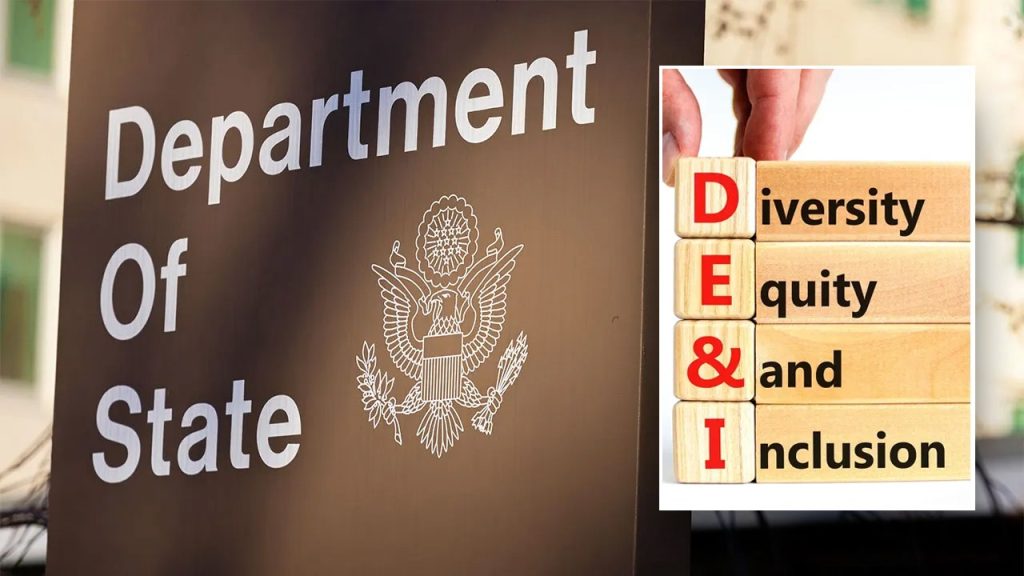In a significant policy shift, the Department of Government Efficiency (DOGE) and the State Department announced the termination of certain diversity, equity, and inclusion (DEI) requirements that had previously influenced the performance evaluations of Foreign Service Officers under the Biden administration. Secretary of State Marco Rubio hailed this move as a restoration of merit-based assessments, emphasizing that evaluations will now focus on substantive qualities rather than subjective characteristics. This decision comes alongside broader budget cuts affecting DEI initiatives across various federal programs, as part of an agenda driven by the current administration to realign federal employment practices.
| Article Subheadings |
|---|
| 1) Overview of DEI Policy Changes |
| 2) Secretary Rubio’s Stance on Merit-Based Evaluations |
| 3) Examples from New Performance Evaluation Guidelines |
| 4) Broader Implications of DEI Cuts Across Federal Programs |
| 5) The Financial Impact on Taxpayers |
Overview of DEI Policy Changes
The announcement by the DOGE and the State Department reflects a decisive moment in the ongoing debate over diversity, equity, and inclusion initiatives within federal agencies. Under previous administrations, particularly during the Biden administration, DEI considerations played a notable role in appraisals and hiring processes. A policy requiring up to 20% of performance assessments for foreign service officers to incorporate DEI elements has now been revoked, allowing for evaluations to become more performance-centric. This realignment is part of a wider movement within the current administration that seeks to eliminate perceived biases and emphasize competence and achievement in professional settings.
Secretary Rubio’s Stance on Merit-Based Evaluations
Secretary of State Marco Rubio expressed firm support for the recent reforms, characterizing them as both “important and historic.” Through various communication channels, including social media, he articulated the necessity for foreign service evaluations to hinge on objective merit rather than “arbitrary immutable characteristics.” This emphasis on meritocracy is a clarion call aimed at ensuring that professional growth and recognition within the foreign service are determined by actual performance and results, rather than adherence to ideological frameworks tied to DEI initiatives. As part of the transition, Rubio and DOGE have worked collectively to dismantle any policies that might lead to perceived preferential treatment based on demographic factors.
Examples from New Performance Evaluation Guidelines
In a detailed presentation outlining the new evaluation guidelines, a set of PowerPoint slides was released to elucidate the changes. The slides provided concrete examples of language to avoid during evaluations, such as descriptors deemed gendered or indicative of bias. For instance, phrases that could evoke unintended gender stereotypes were discouraged. Instead of stating, “Dr. Sarah Gray is a caring compassionate physician,” evaluations would now favor neutral phrasing like “Dr. Joel Gray has been very successful with his patients.” Other examples included a retreat from using “faint praise,” illustrated by examples like, “S/he worked hard on projects that s/he was assigned.” The aim of these adjustments is to ensure that evaluations are grounded in measurable outcomes rather than subjective interpretations of role performance.
Broader Implications of DEI Cuts Across Federal Programs
The implications of these policy shifts extend beyond the State Department as DOGE draws attention to the elimination of DEIA (Diversity, Equity, Inclusion, and Accessibility) initiatives across multiple federal programs. Following these reforms, it was observed that local organizations are advised against promoting DEI training and related events, encouraging a re-evaluation of priorities in how diversity and inclusivity are perceived within government operations. Recent moves also coincide with significant cuts in federal funding for various DEI-related projects, suggesting a broader strategy to curtail such expenditures nationwide.
The Financial Impact on Taxpayers
The financial ramifications of DOGE’s transformative initiatives are noteworthy. Supporters of the policy claim that these collective adjustments have already resulted in substantial savings—around $140 billion as reported on the DOGE website. This figure translates to an approximate savings of $870 for each taxpayer, sparking discussions about the responsible use of government funds. These figures underline a focus on efficiency and accountability, aiming to ensure taxpayer money is utilized effectively rather than allocated to what some view as divisive or unnecessary initiatives.
| No. | Key Points |
|---|---|
| 1 | The recent changes eliminate DEI requirements from Foreign Service Officer evaluations. |
| 2 | Secretary Marco Rubio emphasizes returning to a merit-based evaluation system. |
| 3 | New guidelines discourage gendered and biased language in evaluations. |
| 4 | Federal funding cuts include reductions to DEI programs across various agencies. |
| 5 | Policy changes aim to save taxpayers significant amounts of money. |
Summary
The shifts in policy by DOGE and the State Department signify a resolute pivot toward meritocracy, marking a departure from past practices that heavily factored in DEI metrics. The changes, supported by notable figures such as Marco Rubio, aim to enhance the integrity of performance evaluations and ensure accountability in government spending. As these new guidelines take effect, they could reshape the landscape of federal employment, impacting not just the foreign service, but potentially all sectors of government in the long run.
Frequently Asked Questions
Question: What are the new performance evaluation guidelines for Foreign Service Officers?
The new guidelines prioritize merit-based assessments, eliminating previous DEI factors from evaluations to focus solely on performance and outcomes.
Question: How do these changes impact government spending?
The changes are expected to result in significant savings for taxpayers, with reports suggesting cuts amounting to around $140 billion as a result of various DEI program eliminations.
Question: What has been the response from government officials regarding these changes?
Officials, including Secretary Marco Rubio, have expressed strong support for the policy shifts, arguing they restore meritocracy to federal service evaluations and eliminate perceived biases.
